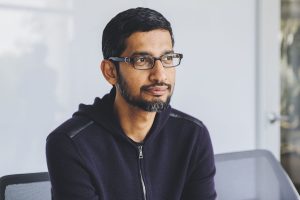Sundar Pichai is leading a company at a major inflection point, and he wants to be on the right side of history.
Since 2015, Pichai has been at the helm of Google, which is parent company Alphabet’s largest and most profitable unit. The tech giant earned $31.16 billion in revenue in the first quarter of this year. But Pichai is not content to rest on his laurels. Last month, he debuted a suite of AI products across G Suite and Google Cloud that chart a bold new course for the company.
These products include a voice robot which can book appointments at call centers or small businesses with uncanny resemblance to a human voice. Other tools that will likely be employed regularly by everyday Google users are more extensive smart replies, an automatic grammar checker, voice commands for hangouts and enhanced security features.
Based on his public comments, it is clear that Pichai believes this type of technology is only the beginning. The CEO indicated he intends to continue to invest in AI technologies across the spectrum of the company’s products, from maps to search, chat to content management through Google Docs.
Google is also providing developer-friendly tools to help programmers build open source products. The tools include AI capabilities such as instant language which will make it easier for development. It’s a massive opportunity, as an estimated 1.17 billion people use Google Search. The company also has six additional products that each have over a billion annual users, including Maps, Chrome and Android.
But expansion has not always been seamless. Google and Pichai raised eyebrows earlier this year among employees who protested the company’s partnership with the Department of Defense to develop AI drone technology. Pichai and his management team have stepped away from that project and stress that the company is committed to leveraging AI for socially beneficial purposes and not for use in the battlefield.
One project widely touted by Pichai at San Francisco’s Cloud Next Conference earlier this year was a retinal scan that can detect a patient’s impending heart attack or stroke.
Pichai earned his undergraduate degree in metallurgical engineering from the Indian Institute of Technology Kharagpur. He also holds an M.S. in Material Sciences and Engineering from Stanford University and an MBA from the Wharton School at the University of Pennsylvania.
























